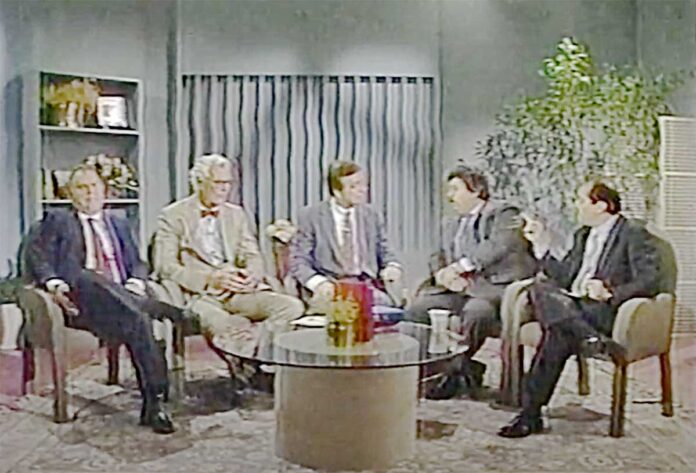
In the New York Times obituary of Senator Jesse Helms, the author, Steven Holmes, writes: “[Helms] fought bitterly against federal financing for AIDS research and treatment, saying the disease resulted from “unnatural” and “disgusting” homosexual behavior.” Later in the obit, another of Helms numerous anti-gay quotes appears: “Nothing positive happened to Sodom and Gomorrah,” [Helms] said, “and nothing positive is likely to happen to America if our people succumb to the drumbeats of support for the homosexual lifestyle.”
The Times could have chosen from many of Helms’ discriminatory and marginalizing statements, but the more important point is that they included his anti-gay rhetoric at all. Helms’ statements and actions caused a great deal of anger and pain for the LGBTQ community. By including the homophobic quotes, the New York Times recognized that a) Helms said those things, and b) they were worth remembering as a part of history.
The Philadelphia Inquirer, in their obituary of Francis Rafferty, didn’t seem to share that sentiment, despite plenty of documented evidence and testimony of Rafferty’s anti-gay stances. In the Inquirer obit, the only hint of Rafferty’s treatment of the gay community is in the following line, which details his fight with City Council colleague Julian Blackwell:
“The fights helped alienate Mr. Rafferty from gay rights activists because Mr. Rafferty yelled a homophobic slur at Blackwell. The LGBTQ community made defeating Mr. Rafferty a priority, and he lost reelection in 1991.”
But “yelling a homophobic slur” during a fight does not at all capture the vehement anti-gay behavior Rafferty displayed for years. Rafferty’s opposition to the LGBTQ community was more than a mere slur yelled at a fellow politician. The Inquirer obit makes it seem like that yelled slur was the extent of his anti-gay actions. Rafferty continually voted against LGBTQ legislation and spoke out against the LGBTQ community, and he went on TV shows to promulgate his views.
On one such program, a moderated debate about Council passing a gay pride resolution, Rafferty, Thatcher Longstreth, Angel Ortiz, and Mark Segal sat down with host Wally Kennedy. During the debate, Rafferty said, among many things directed to Segal and the gay community:
“You people create nothing but malice, you give birth to nothing but frustration and failure. I don’t know where you think you should be proud of anything.”
Later in the debate, Raffery said: “Were you born gay? Would you spread your ill on some little child? Being Irish is not perverting some kid, but being gay is perverting some child, and that’s exactly what you foster.”
The video, which can be viewed online, is hard to stomach, especially for those in the LGBTQ community who lived through it, many of whom are still alive. Those who were there know how much hurt Rafferty caused the community. But for those who weren’t there, or for people who simply didn’t know of such incidents, videos like that one are plain to see and hear. There are also newspaper articles where Rafferty says similar anti-gay statements.
Why does it matter that The Philadelphia Inquirer obituary downplayed Rafferty’s opposition to the LGBTQ community? It matters for a few reasons.
First, Rafferty’s behavior is evidence of the homophobia that the LGBTQ community had to face in the ‘70s, ‘80s, and ‘90s, the type of abuse that LGBTQ people had to confront every day. The Inquirer is the largest and most recognizable newspaper in Philadelphia. It’s also one of the most widely read. When a student writes a history paper on Philadelphia politics, or when a person in general wants to learn about Philadelphia history, they’ll probably turn to old Inquirer articles. And that person deserves to know the truth about how some Philadelphia politicians treated the LGBTQ community.
Second, Rafferty never publicly apologized for his remarks or his behavior towards the LGBTQ community. Thatcher Longstreth, who appeared in the news debate with Rafferty, did apologize for his anti-gay behavior and became an ally to the community. Rafferty, on the other hand, never apologized for what he said and did. Mark Segal, David Fair, Scott Wilds and other community leaders all had encounters with Rafferty where he said hurtful, homophobic things. None of those leaders ever got an apology. In one instance, which was taped by Channel 10 and recounted in the Daily News, Rafferty pushed Fair to the ground during an encounter.
Finally, an obituary is not a eulogy. A eulogy is given by a friend or family member to help people grieve a lost loved one. Rafferty’s family and friends deserve to grieve and to remember him in their own way. Losing a loved one is always hard.
But it is not a newspaper’s job to deliver a eulogy. It’s a newspaper’s job to accurately reflect what a person did in their life. The Jesse Helms obituary in the New York Times accurately portrays what Helms did in his political life, including his anti-gay statements and actions. The same thing can’t be said about the Inquirer’s obituary of Rafferty. The Inquirer obituary marginalized the LGBTQ community’s history, a history which Rafferty is a part of whether he wanted to be or not.
A lot of people still feel pain over his words and actions. Have they gotten over that pain? Maybe. But that doesn’t mean that The Philadelphia Inquirer should ignore it. Rafferty said those things on TV. He voted those votes in Council. It’s not a matter of opinion. It’s documented fact. It happened.
Homophobia has happened in the past, it happens in the present, and it will happen in the future. And if we do one thing in the newspaper business, it’s to write what happened. It’s a shame that wasn’t done in this case with the Inquirer. But, as our community has always done, we can hope for better in the future.
